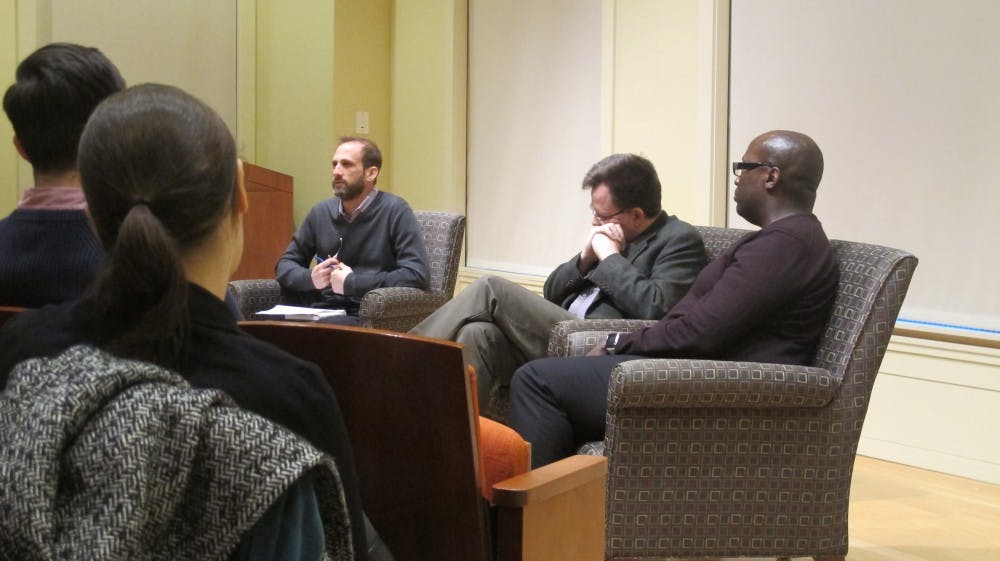Princeton University professor Keith Whittington and Associate Dean of Diversity and Inclusion Moses Davis discussed free speech on college campuses in Mason Hall on Tuesday. IDEAL, a student organization that promotes both nonpartisan and bipartisan civic engagement on campus, hosted the event.
Adam Sheingate, the chair of the Political Science department, served as moderator. He opened the discussion by asking audience members what questions they may have or areas that they would like to investigate.
Michael Shang, a senior Residential Advisor (RA), asked the speakers to weigh in on the best course of action when students in his residence hall post inflammatory and unproductive messages on interactive community boards.
Whittington responded by explaining some of the ideas in his most recent book, Speak Freely: Why Universities Must Defend Free Speech.
“A fairly robust space for free speech on college campuses is essential to what I see as the core mission of a university, which I see as high-level inquiry,” he said.
He made the distinction, however, between rampant broadcasting of thoughts and constructive dialogue.
“Anonymous postings on a whiteboard might not be the best mechanism for doing that because it encourages people to go down paths that they wouldn’t normally go down very quickly or easily if they actually had to talk to one another face-to-face,” Whittington said.
Davis said that he thinks it is important for students to be exposed to different perspectives and engage with different worldviews in college. However, he believes that some ways are more productive than others in interacting with those who hold opposing views.
For Davis, civility is the key component that needs to be taught on college campuses, because he believes it will foster intellectual growth. When students engage in civil discourse, he said, that is when they can exchange ideas.
“How do I honor you and your opinion or thought at the same time, honor my own token or thought or where I am in my intellectual journey academically, so I don’t create a space where you can’t be here?” he said.
Another student asked the speakers what they believe constitutes harmful speech. Both Whittington and Davis believe that individuals should think critically about the impact of their words.
“There are certainly lots of encounters we’re going to have with people where... there’s little to be gained from engaging,” Whittington said. “We should try to minimize those encounters.”
However, he believes hurtful comments can have the potential to help others learn and change.
“The pain can often be quite real and yet the pains are important ones, and we in fact have to push through and grapple with it,” Whittington said.
Davis talked about the transformation that students may undergo during their undergraduate years and the positive aspects of that transformation.
“That’s the beauty of college,” he said. “You go in thinking one thing, then you have all these experiences, academically, professionally and personally that just kind of shake you up. Then you graduate and when you walk off that stage, you are a completely different individual.”
The speakers also addressed how they think colleges should grapple with the difficulties of managing campus demonstrations and protests.
“How do we engage in political activities without getting in each others’ way too much?” Whittington said. “Thinking about the limits on protest is largely about how to coordinate protest activities with other activities we’re trying to do.”
He explained that demonstrations should not be obstructing other students’ access to activities and opportunities, but that likewise, the dissent of one group is not a sufficient reason to shut down a protest, which Sheingate and Whittington referred to as “heckler’s dissent.”
“The concern is that you don’t want to allow somebody who disagrees with a particular activity that’s going to [take] place, whether it’s a speech or a march or a demonstration, to have the capacity to prevent that,” Whittington said.
Ultimately, Davis urged students to ask themselves about the impact of their speech on others and to challenge themselves to work with conflicting ideas.
“How do I live between those two truths, where I vehemently disagree with you, but I also believe that you have the right to say what you want to say. And what do I do with that?” he said. “If you’re lucky, there’s some healthy debate that happens.”
Senior Michael Shang said that he still wanted to know more information about the role of protests.
“There’s an argument to be made that protest that is not disruptive has no purpose. If you don’t disrupt anything, then you can’t be said to have had an actual impact,” he said.
Sophomore Christina Iruela Lane, the deputy secretary of state of IDEAL, explained the group’s motivation for promoting free speech and holding an event centered around free speech.
“We don’t want to impede anyone from any one side or another, because we know that our world today is so polarized,” she said.





